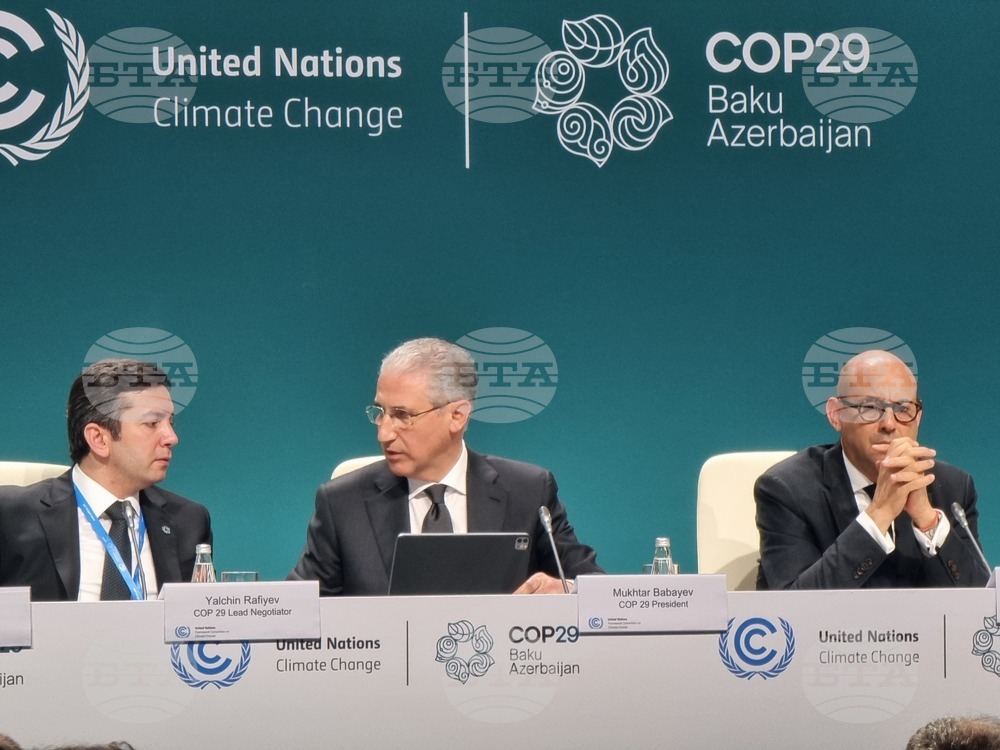site.btaWeek Two of COP29 Hears Call by Leading Figures to Step Up Talks and Leave Time for Important Political Decisions


The second week of the COP29 Climate Change Conference in Baku opened Monday with calls by leading figures to speed up the negotiation process and leave time for the important political decisions and bring the countries closer to common ground.
The EU will continue to lead the way, we will continue to build bridges for countries around the world and we will stay engaged," Wopke Hoekstra, the European Commissioner for Climate Action, said at the EU's first press conference at COP29.
He called on the Azerbaijani presidency to start rallying the conference parties around more concrete facts as early as possible this week, noting the clear and heavy responsibility on the shoulders of the presidency to bring these important and difficult negotiations to a successful outcome.
The Commissioner, who is the EU's chief negotiator at the conference and will lead the climate portfolio in the next European Commission, highlighted three crucial factors in the fight against climate change.
Hoekstra noted countries' responsibility based on emissions and economic growth, the need to target money first and foremost to the countries that need it most and are most vulnerable, and, last, the reality that public funds will never be enough.
COP29 President Mukhtar Babayev pointed out that much remains to be done despite progress made, including on Article 6 of the 2015 Paris Agreement governing carbon trading.
Article 6, Paragraph 8, on non-market-based approaches, was formally agreed on Monday, he said, following earlier agreement on Paragraph 4 of Article 6.
"These are important steps towards the conclusion of the Article 6 negotiations," stressed Babayev, who is also Azerbaijan's Minister of Ecology and Natural Resources.
Among the achievements, he highlighted the Baku Action Plan for Local Communities and Indigenous Peoples Platform.
Babayev also stressed the need for work on the negotiations to be accelerated during the remaining four days of the conference and expressed concern that the parties are not moving fast enough.
Now, with the ministers in Baku, the parties need to work together to find a solution to the key political problems, he said.
In terms of achieving the New Collective Quantified Goal on Climate Finance (NCQG), which should increase climate finance for developing countries from the current USD 100 billion, no figures could be given at this time, he said. This goal is being pointed to as a key task of the Baku conference.
Both Commissioner Hoekstra and Babayev stressed the importance of mitigating climate change and, more specifically, agreeing on an international market for carbon emissions.
Calls to accelerate the negotiation process were echoed by UN Climate Change Executive Secretary Simon Stiell. He said that at the start of the second week of negotiations, the picture is mixed: despite what has been achieved, especially on the carbon market, much remains to be done, work needs to be accelerated to get COP29 to the desired outcome.
He urged the participants to "wrap up less contentious issues as early as possible this week, so there is enough time for the major political decisions". "Bluffing, brinksmanship, and pre-mediated playbooks burn up precious time and run down the goodwill needed for an ambitious package. So let's cut the theatrics and get down to real business," he said.
The COP29 leaders also called on the G20 group, whose leaders meet Monday and Tuesday in Rio de Janeiro, to send a positive message of commitment to tackling the climate crisis.
In his remarks, Babayev said that the G20 countries account for 85% of global GDP and 80% of emissions, and there can be no success in tackling climate change without the G20 countries.
/NF/
news.modal.header
news.modal.text